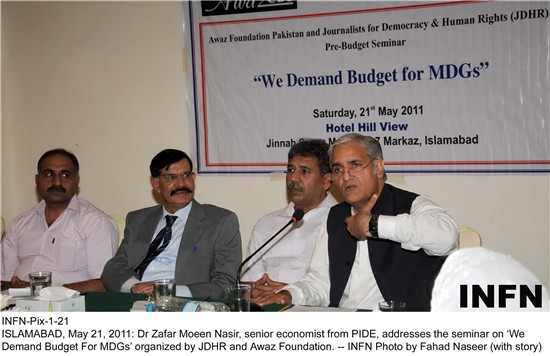 10% of GDP each year needed to achieve MDGs target by 2015: Speakers
10% of GDP each year needed to achieve MDGs target by 2015: Speakers
Each district be given Rs 2b for development; local bodies be restored for better service delivery
Rising poverty necessitates at least 10% of the GDP to be spent on education, health, safe drinking water and sanitation and basic infrastructure to achieve Millennium Development Goals (MDGs) by 2015. In South Asia, India leads with 9% of its GDP spending only on health and education while Pakistan spends around 3% on both.
This was a key demand at a pre-budget Seminar on “We Demand Budget for MDGs” held here Saturday. Global Call to Action against Poverty (GCAP) Pakistan, Awaz Foundation Pakistan and Journalists for Democracy and Human Rights (JDHR) have jointly organized the seminar. The speakers on this occasion reminded that Pakistan had committed to invest to achieve MDGs at UN MDGs Summit in September 2010 in New York and SAARC Summit in 2010 in Dhaka.
Dr Zafar Moeen Nasir, senior economist from PIDE said since we as a nation have committed to achieve MDGs by 2015, we have to address the issue of growing hunger and poverty and get away with mismanagement in economic governance. “We need to decentralize the development budget at districts level by allocating Rs. 2 billion per year for consecutive ten years so that all districts can plan and implement their development needs. Putting all districts in competition can produce good results. We need to rationalize subsidies limiting it to a few food items to end hunger, the first MDG,” he added.
He said in the forthcoming budget, Rs 710 billion have been earmarked for education, child and female morality and other social sector development. Of them, Rs 430 billion will be expensed through provinces while Rs 280 billion will be spent by centre. He called for linking up economy with MDGs. “We need political commitment to ensure services delivery under MDGs commitments. Unfortunately, no one is ready to pay direct tax.” He called for proper budget estimation based on actual incomes and spending.
Sajjad Ahmad Shaikh, Joint Secretary Ministry of Finance said budget is announced for the welfare of general public. Budgetary deficit is decided in advance, which is bridged through loans. “Before budget allocation, we do situation analysis of each sector. We need to do post budget analysis to ensure implementation of the budget. We need to understand limitations of the government. We should take up all MDGs achievement related demands to the provinces after the 18th amendment, as now resources will be transferred to the provinces.
He said through legislation, it has been made mandatory to maintain fiscal responsibility and debt ratio has been controlled under this legislation and hence in a way commitments relating to MDGs are given protection. Our social sector spending is about to reach 8.5% mark. There should be a pressure on the government to press for their demands on MDGs. Revenue and financial sector should be reformed. He said our focus should be on direct taxation and we need to build a campaign to safeguard the poor who are affected by indirect taxes. He said women’s work is mostly unpaid and do not become part of the economy. We need to make it part of the economy, Sajjad added.
Fayyaz Baqir, Director Akhtar Hamid Khan Centre, said unfortunately, our financial system transfers resources from the poor to rich, which should be otherwise. We need to analyze the financial system to tell the poor the truth and plug in all loopholes. We need to tell people at local level as to how money is taken away from the poor. Civil society should think beyond projects. We need to work in universities and with the youth to mobilize them to undertake research on social issue. He called for training 50,000 youth in research to develop evidence-based discourse instead of discussion based discourse.
Earlier, setting the scene for the debate, Shafqat Munir President JDHR said MDGs are not luxurious concessions but very basic services to be, otherwise, dispensed with at local level. The government needs to generate resources and spend them on people through local representatives. To effectively provide these services, there is an immediate need for restoration of local governments with strong governance mechanism and financial independence and accountability and monitoring of the system by citizens. On resource mobilization for MDGs, Shafqat demanded imposition of tax on agriculture income. “It is ironic that the rich are paying peanuts in tax while the poor paying billions in terms of indirect taxes”, he added
Quoting the Poverty Reduction Strategy Paper-II, Mohammad Zia-ur-Rehman, Chief Executive Awaz Foundation and Coordinator for GCAP South Asia pointed out that only 0.6% of the GDP is spent on health and 2.1% of GDP on education sectors. In addition to this inadequate resource allocation on these important sectors, the government frequently cuts their budgets. The most recent 30% budgetary cut in Public Sector Development Programme (PSDP) was done in April, 2011 to fulfill IMF’s conditions for regular installment of the loan. The situation of internal and external debts is alarming as one of the main reasons to accelerate poverty.
Rana Riaz Saeed, Member National Steering Committee GCAP said current phenomenon of poverty is causing social and political damages especially in the context of war against terror and after nationwide disastrous floods in 2010. Energy crisis has been further aggravating the poverty and unrest in the society. According to the independent research studies about 45% population of Pakistan live below poverty line (US $ 1 per day) and about 7.8% people are unemployed and out of these unemployed 46.8% are unable to join any employment opportunity if available because of their poor health conditions. More than 70% of the population does not have access to safe drinking water thus are suffering from deadly diseases like Hepatitis and TB. Per capita income has been dropped from US$ 960 to US$ 661.